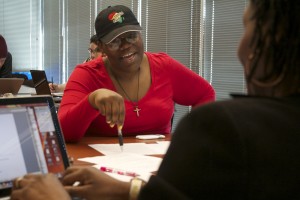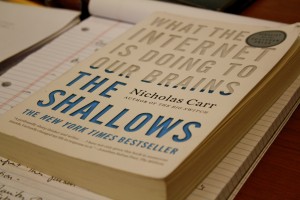Tags
Related Posts
Share This
Left To Our Own Devices
For a second year, instructors Dale Dunn and Lynn Goodwin of the playwright workshop Just Say It plow away with their participating SFUAD students in writing, producing and performing an end-of-the-year show at Warehouse 21 at 7 p.m., April 24-26 and 2 p.m. on April 27.
Coming from a variety of majors and skill sets, 10 students (plus two high schoolers from New Mexico School of the Arts) began by reading plays, practicing structure and writing personal reflections, and have since shaped those reflections into monologues and scenes addressing bullying in the electronic age. Currently in the stage of finalizing their scripts, students now anticipate the performance aspect of the class: speaking in front of a live audience. Some, however, like Creative Writing Major Chantel Mitchell, a second year Just Say It playwright, are familiar with the rush that comes from speaking words aloud. In fact, instructors Dunn and Goodwin say Mitchell and many others ended up “bringing the house down” last year. They even named their class after a line from Mitchell’s script: Just Say It.
“It’s normal and natural even for actors who have been performing to get nervous,” says instructor Goodwin, who also is a dramaturgist and actress. “Nerves are normal and fine but we feel that it’s a good experience for writers to speak their own words in front of the audience.”

Creative Writing Major and second year Just Say It playwright Chantel Mitchell. Photo by Charlotte Martinez
Goodwin began working with her co-instructor Dale Dunn in SFUAD’s playwriting workshop after she and Dunn produced Women’s Voices II in 2011 and 2012 under community theater company Santa Fe REP.
“It was about the choices we make,” Dunn, also an actress and writer, says, describing the Woman’s Voices project. “You don’t know where you’re going until you get there.” Keeping those same principles, Dunn and Goodwin decided to separate from Santa Fe REP and launch a workshop at SFUAD for both women and men called Just Say It. Working from “page to stage,” as Dunn and Goodwin put it, both instructors work closely with their students to produce an authentic and powerful message through live theater.
“We really want the community to hear these young voices,” Goodwin says, “we feel it’s important that younger students are heard.”
In addition to playwriting, Dunn and Goodwin dive into close character study, often exploring emotional connection to the material.
“Compared to other genres,” Creative Writing student Mitchell says, “to fully present a play you have to really understand human beings, their mannerism, their behaviors.” Due to the many personal undertakings, Mitchell adds that she has nicknamed the class ‘therapy’. “I do a lot of self inspection anyway,” Mitchell says, “I’m a poet, I’m a writer, but in this class it’s like ‘think about what you’re feeling, then think about what you’re thinking about feeling.’ It can be quite annoying actually, but it causes me to produce not just good work, but meaningful work.”
Dale and Goodwin say that last year and this year they began their workshop with no preconceptions. They were, however, ready to provide the tools needed for the students to form their ideas. “You have to let them go,” Dunn says, “and you never know what you’re going to get.” This year, the theme of bullying and young people living in the electronic age are addressed in their current play titled Left To Our Own Devices, Staying Connected in the Digital Age.

One of the many books to inform the theme of bullying in the electronic age. Photo by Charlotte Martinez
“We’ve kind of shaped it into something that speaks on the lack of human interaction and human connection in today’s world,” Mitchell says. “We’re talking about how the internet is used and how we don’t connect anymore as much as we used to. It’s kind of like an addiction. We’re addicted to our disconnect. We’re no longer content with doing nothing. We have to pull out our phones. We have to distract ourselves from nothingness now and it’s kind of sick.”
Goodwin adds that in this generation’s ability to go anywhere in the virtual world, their focus has become fractured. “It’s been really interesting to hear from the students and the challenges they’ve faced,” Goodwin says.
In describing the show-to-come, Mitchell sends the following message: “Everything that you see is going to be us. We’re going to become like a real live virtual internet. We’re going to have status updates, like how many advils does it take to die? So many elements of real life, real human vulnerability. You want life? Come to this play.”
Left To Our Own Devices, Staying Connected in the Digital Age
$10.
7 p.m., April 24,25,26 a
2 p.m. April 27
Call 820-7112 for reservations.






 Jackalope Magazine is the student magazine of Santa Fe University of Art and Design. Building on the interdisciplinary nature of our education, we aim to showcase the talent of our university and character of our city.
Jackalope Magazine is the student magazine of Santa Fe University of Art and Design. Building on the interdisciplinary nature of our education, we aim to showcase the talent of our university and character of our city.
0 Comments
Trackbacks/Pingbacks